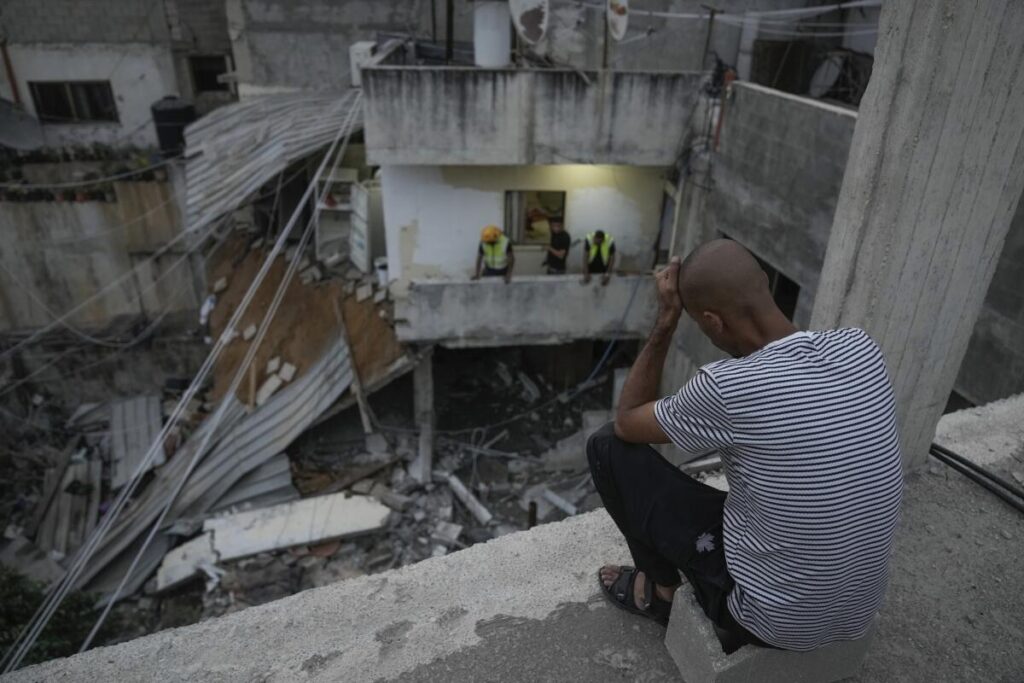
Israeli airstrikes struck militant sites in Gaza on Sunday for the third straight day, the Israeli military said, after Palestinian militants near the border fence launched incendiary balloons into Israel and threw an explosive at soldiers. The strike came on the heels of an Israeli military raid in the northern West Bank that Palestinian health officials said killed two Palestinians.
It was the latest bloodshed in a surge of violence during a sensitive Jewish holiday period. A series of violent escalations on the border between Israel and Gaza over the past week has raised the specter of an escalation for the first time since a brief round of conflict last May between Israel and the Palestinian Islamic Jihad militant group.
It comes at a fraught time. Jews are set to mark Yom Kippur, the holiest day on their calendar, on Sunday night followed by the weeklong Sukkot festival later in the month.
There were no reported casualties from the strikes in Gaza. Earlier on Sunday, the Israeli military shot and wounded five Palestinians who were rallying at the separation fence along the Israeli frontier with the crowded enclave. It’s a familiar tactic for Palestinians in Gaza protesting a 16-year blockade imposed by Israel with Egypt’s help. Israel says the blockade is needed to prevent the ruling Hamas militant group from arming itself.
The Israeli army said Sunday it had targeted two posts belonging to Hamas, the militant group that rules Gaza, just east of the Bureij refugee camp and Jabaliya. The posts were close to the fence separating the territory from Israel, where dozens of Palestinians have been holding daily demonstrations for the past week.
Rising tensions were also palpable in the West Bank.
Earlier in the day, the Israeli military said it moved into the Nour Shams refugee camp, near the town of Tulkarem, to destroy what it described as a militant command center and bomb-storage facility in a building.
It said that engineering units detonated a number of bombs planted under roads and that militants opened fire and hurled explosives, as troops responded with live fire.
The Palestinian Health Ministry said two men — Asid Abu Ali, 21, and Abdulrahman Abu Daghash, 32 — were killed by Israeli fire. The raid caused heavy damage to the camp’s main road, severing water pipes and flooding parts of the street. The ground floor of the targeted building was heavily damaged, while part of the exterior wall of the second floor collapsed.
The Hamas militant group claimed Abu Ali as a member.
Elsewhere in the West Bank, Birzeit University, a major Palestinian institution, said the Israeli army carried out a rare raid on its campus near the city of Ramallah and arrested nine students, including the head of the student council. It said the students were all supporters of the Hamas militant group. The university denounced the raid, which it said caused damage to university property.
The Israeli military claimed the suspects were plotting an attack on Israeli targets.
Israel has been carrying out stepped-up military raids, primarily in the northern West Bank, for the past year and a half in what it says is a campaign to root out Palestinian militants and thwart future attacks.
But Palestinians say the raids entrench Israel’s 56-year occupation over the West Bank. The raids have shown little sign of slowing the fighting and contributed to the weakening of the Palestinian Authority, the self-rule government that administers parts of the Israeli-occupied West Bank.
Some 190 Palestinians have been killed in the West Bank since the start of the year, according to a tally by The Associated Press. Israel says most of those killed have been militants, but youths protesting the incursions and others not involved in the confrontations have also been killed.
At least 31 people have been killed in Palestinian attacks against Israelis this year.
On Saturday, Israeli airstrikes hit a militant site for the second time in two days, after Palestinians sent incendiary balloons into Israeli farmland and Palestinian protesters threw stones and explosives at soldiers at the separation fence
The spike in violence comes during the Jewish New Year holiday season. Jews are set to mark Yom Kippur, the holiest day on their calendar, on Sunday night followed by the weeklong Sukkot festival later in the month.
During Sukkot, large numbers of Jews are expected to visit Jerusalem’s most sensitive holy site, revered by Jews as the Temple Mount and Muslims as the Noble Sanctuary. The compound, home to the Al-Aqsa Mosque, is often a focal point for violence.
Israel captured the West Bank, east Jerusalem and the Gaza Strip in the 1967 Mideast war. The Palestinians seek those territories for their hoped-for independent state.




